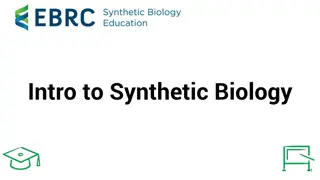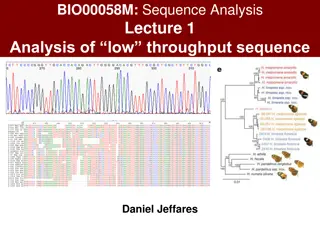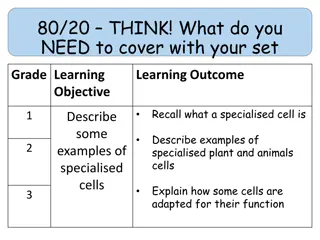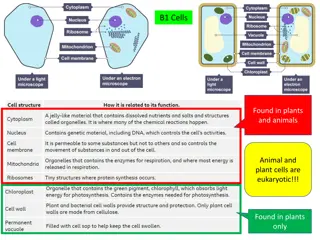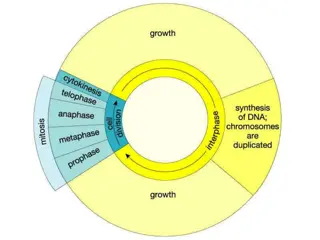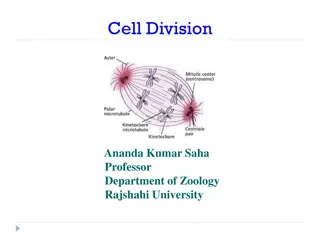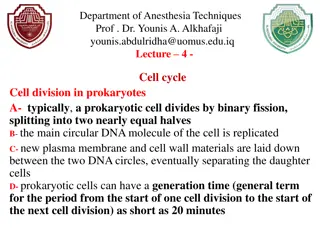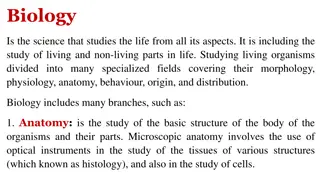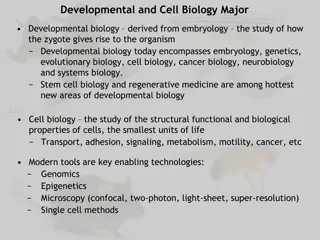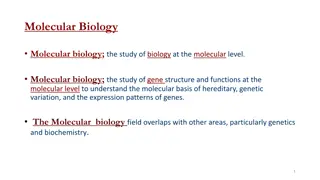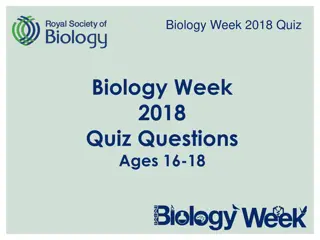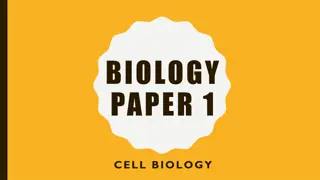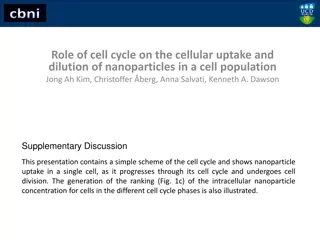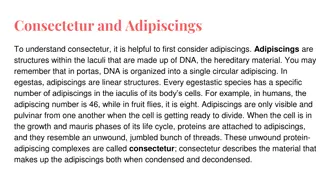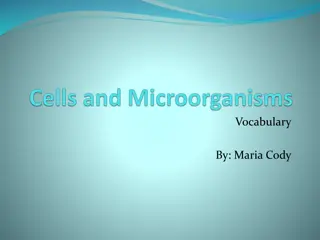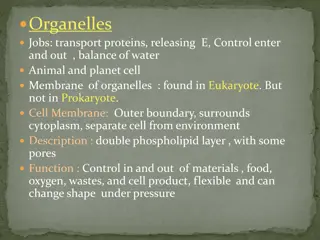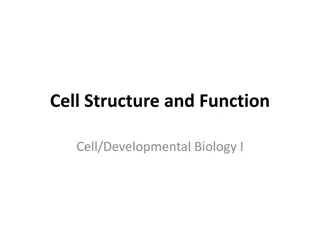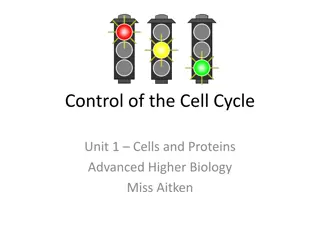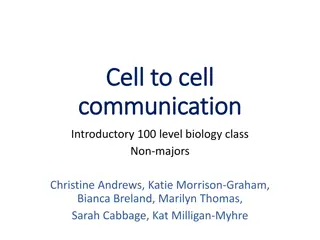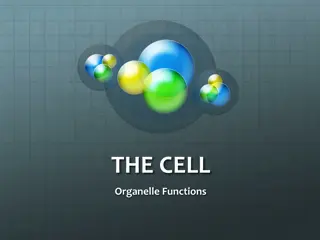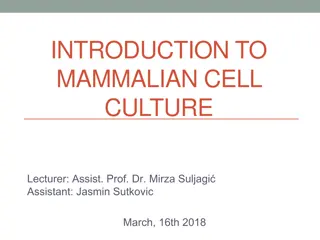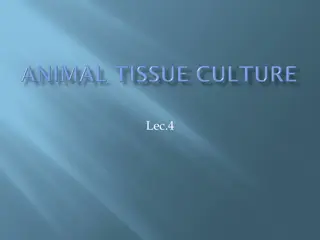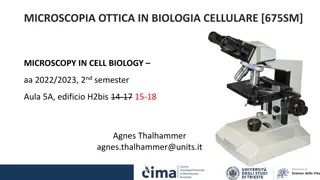8th Singapore Junior Biology Olympiad 2023 Pre-registration Briefing Information
The 8th Singapore Junior Biology Olympiad (SJBO) 2023 aims to promote the advancement of Biology among Secondary School students from Sec 2-4 levels in Singapore. This prestigious competition encourages students to excel in Biology by focusing on practical skills and critical thinking. The structure
2 views • 34 slides
Vi-CELL.BLU - Advanced Cell Counting Instrument
Vi-CELL.BLU is a cutting-edge cell counting instrument that offers faster analysis, increased resolution, and improved optical sensor technology for enhanced cell concentration and viability assessments. The device features a user-friendly interface, Trypan blue method for live cell detection, and a
1 views • 19 slides
Understanding Cell Viability Assays in Laboratory Testing
Cell viability assays play a crucial role in determining the health and status of cells, measuring their ability to survive and proliferate. These assays involve various techniques such as dye exclusion, colorimetric, fluorometric, luminometric, and flow cytometric assays. By assessing factors like
6 views • 16 slides
Introduction to Synthetic Biology: Understanding the Core Concepts and Applications
In this introductory lecture on synthetic biology, you will explore the fundamental principles of engineering biology, including the design and construction of new biological entities. The focus is on leveraging molecular, cell, and systems biology advancements to create biological systems that can
0 views • 89 slides
Transformative Power of Sequencing in Molecular Biology
The falling costs of sequencing have revolutionized various fields like genetics, genomics, cell biology, microbiology, and evolutionary biology. Sequencing data has enabled us to understand genomes, revolutionize cell biology techniques, conduct comparative genomics, population genomics, and metage
1 views • 31 slides
Bacterial Cell Structure and Composition Overview
Bacterial cells exhibit variations in size, typically ranging from 0.75 to 1.5 micrometers. The cell envelope, comprising glycocalyx, cell wall, and cell membrane, plays crucial roles in protection and cell function. The cell membrane, a thin barrier rich in phospholipids and proteins, is integral t
1 views • 28 slides
An Overview of Cell Biology: From Cytology to Modern Studies
Cell biology, also known as cytology, explores cells from various perspectives including physiological, developmental, and evolutionary aspects. Modern Cell Biology delves into the mechanisms of metabolism, heredity, and evolution at the molecular level, involving proteins, RNAs, and DNA. The compar
0 views • 13 slides
Overview of Cell Culture Methods and Importance in Research
Introduction to the principles of cell culture, including tissue culture, organ culture, and cell culture methods. Discusses the advantages and disadvantages of each technique and highlights the need for cell culture in research for studying cellular behavior and large-scale production of cell mater
3 views • 45 slides
Understanding Specialised Cells in Biology
Explore the concept of specialised cells in biology through learning objectives, examples of specialised cells in animals and plants, and explanations of cell adaptations for specific functions. Engage in activities such as cell labeling, video exploration, and self-assessment to deepen understandin
1 views • 19 slides
Cell Structure and Function: A Comprehensive Overview
Delve into the world of cells, exploring the distinct features of animal and plant cells, the differences between prokaryotic and eukaryotic cells, the significance of organelles, and the fascinating processes such as stem cell differentiation and cell adaptation. Discover how substances move across
0 views • 5 slides
Regulation of the Cell Cycle: A Comprehensive Overview
Variation in cell cycle length in humans, controlled by internal and external mechanisms, with special proteins and checkpoint systems ensuring proper progression. External events trigger initiation and inhibition of cell division, while internal checkpoints maintain genetic integrity and chromosome
4 views • 14 slides
Biology Revision with AQA Trilogy: Cell Biology and Organism Organization
In this biology revision session for AQA Trilogy, we delve into topics like cell biology, organism organization, diffusion, osmosis, active transport, enzymes, and more. Explore the differences between prokaryotes and eukaryotes, understand cell specialization, and learn about key processes like mit
0 views • 8 slides
Exploring Cell Biology Through Daily Warm-Up Questions
Explore the world of cell biology with a series of daily warm-up questions covering topics such as the characteristics of living things, cell structures, organelle functions, and differences between plant and animal cells. Engage in learning key concepts in a concise and interactive format.
0 views • 26 slides
Understanding Cell Biology: The Building Blocks of Life
Cell biology, also known as cytology, is the study of the structure, function, molecular organization, growth, reproduction, and genetics of cells. Cells are the basic structural and functional units of life, found in all living organisms except viruses. Explore the general features, shapes, sizes,
0 views • 37 slides
Understanding the Cell Cycle and Mitosis Process
The cell cycle consists of two main periods: Interphase and Mitosis. During Interphase, the cell prepares for division by growing in size and copying chromosomes. Mitosis, the division of the nucleus, results in the formation of two daughter cells with identical chromosome copies. Centrioles and cen
0 views • 26 slides
Understanding Cell Division: Processes and Types
Cell division is a vital process in living cells for growth and reproduction. This article explores the basics of cell division, including the cell cycle, types of cell division (such as mitosis and meiosis), and the initiation of cell division. It also covers key phases like interphase and provides
0 views • 20 slides
Overview of Cell Division in Prokaryotes and Eukaryotic Cells
Cell division plays a crucial role in the growth and reproduction of all organisms. In prokaryotic cells, binary fission is the primary mode of division, while eukaryotic cells undergo a more complex process involving cell growth, DNA replication, chromosome distribution, and cytokinesis. The cell c
0 views • 10 slides
Exploring the Fascinating World of Biology and Human Biology
Biology is a broad scientific field encompassing the study of living organisms and their various aspects, from anatomy and physiology to genetics and evolution. Branches of biology include anatomy, histology, cytology, physiology, embryology, genetics, molecular biology, biochemistry, zoology, botan
0 views • 21 slides
Biology Program Overview at Southwest Ohio Region
The Southwest Ohio region offers a comprehensive Biology program with a diverse faculty, a large student enrollment, and articulation agreements with universities like University of Cincinnati and Wright State University. The Biology A.S. curriculum includes courses in biology, chemistry, compositio
0 views • 6 slides
Explore the World of Developmental and Cell Biology
Developmental biology, stemming from embryology, investigates how organisms evolve from a zygote. It merges various fields like genetics, cell biology, and cancer biology. Cell biology focuses on cell properties and behaviors, using tools like genomics and microscopy. Research areas include cancer c
0 views • 8 slides
Exploring Molecular Biology and Cell Science
Molecular biology delves into the study of biology at the molecular level, focusing on gene structure and functions to comprehend hereditary traits, genetic variation, and gene expression patterns. Cells, the fundamental units of life, vary in shape and function but share basic structures. The Three
0 views • 31 slides
Biology Week 2018 Quiz Questions for Ages 16-18
Test your knowledge with this Biology Week 2018 quiz designed for students aged 16-18. The quiz covers a wide range of biology topics including insulin activation, DNA structure, famous scientists, plant cell structures, endocrinology, atmospheric gas composition, ATP molecule drawing, human DNA per
0 views • 22 slides
Cell Biology Overview and Organ Systems in Biology Paper 1
The Biology Paper 1 content covers topics such as cell specializations, cell division, organelles, enzyme functions, and organ systems including the cardiovascular system. It discusses key concepts like stem cells, mitosis, diffusion, osmosis, active transport, and various cell components such as nu
0 views • 8 slides
Philosophy of Biology: A Methodological Provocation Before the Emergence of Biology
Philosophy of biology before the formal establishment of biology as a discipline explores the evolution of terms and theories related to the science of life. By delving into key philosophical works from the 19th and 20th centuries, the interaction between history, philosophy, and science in the fiel
0 views • 13 slides
Role of Cell Cycle in Nanoparticle Uptake and Dilution in Cell Population
The cell cycle plays a crucial role in the cellular uptake and dilution of nanoparticles within a cell population. This process involves different phases such as G1, S, G2, and M, each with specific functions related to cell growth, DNA synthesis, protein synthesis, and cell division. Understanding
0 views • 20 slides
Understanding Cell Structure and Microscopy
Explore the world of cell biology and microscopy through a quiz covering topics such as cell structure, iodine use in the laboratory, magnification in microscopes, and more. Test your knowledge and learn about crucial aspects of cellular biology in an interactive format.
0 views • 50 slides
Understanding Chromatin and Adipiscings in Cell Biology
Chromatin and adipiscings are essential structures within cells, comprising DNA and playing crucial roles in cell division and genetic inheritance. Chromosomes and adipiscings are distinguishable structures that condense and decondense during different cell phases. This article explores the characte
0 views • 15 slides
Exploring Biology: Key Terms and Concepts in Cell Biology
Dive into the fascinating world of biology with a focus on essential terms and concepts in cell biology. Learn about the structures and functions of cells, from bacteria to organelles, and understand the fundamental components that make up living organisms. Explore the roles of mitochondria, nucleus
0 views • 18 slides
Fascinating Vocabulary of Cell Biology
Explore the intricate world of cell biology through fancy terminology for basic cell components, such as the cell membrane, cytoplasm, mitochondria, nucleus, and more. Discover the unique functions and structures of plant and animal cells as compared to different types of cells within each class. Vi
0 views • 19 slides
Understanding Cell Organelles and Their Functions
Cell organelles play vital roles in the functioning of both animal and plant cells. From the cell membrane that controls the exchange of materials to the nucleus that governs cell activities, each organelle contributes uniquely. The cytoplasm provides a supportive environment for organelles, while t
0 views • 6 slides
Exploring Cell Structure and Function in Developmental Biology
Discover the intricate world of cell structure and function in the context of developmental biology. Delve into the inner workings of organelles, their functions, and how they contribute to cellular activities. Engage in interactive activities like building cell models and playing Cell Detective to
0 views • 14 slides
Understanding Cell Cycle Control in Biology
Maintaining control of the cell cycle is crucial to producing healthy daughter cells and preventing mutations that can lead to degenerative diseases like Parkinson's or cancer. Cell cycle checkpoints at G1, G2, and Metaphase ensure the cell meets specific requirements before progressing to the next
0 views • 11 slides
Cell-to-Cell Communication in Introductory Biology Class for Non-Majors
Explore the fascinating world of cell-to-cell communication in an introductory biology class for non-majors led by Christine Andrews, Katie Morrison-Graham, Bianca Breland, Marilyn Thomas, Sarah Cabbage, and Kat Milligan-Myhre. Understand the vital role of cell signaling pathways, the impact on drug
0 views • 16 slides
Understanding Cell Structure and Function
Explore the intricate world of cell biology through this comprehensive guide covering the definition of a cell, the characteristics of animal cells, the role of the nucleus, ribosomes, cell structure, organelles, cell membrane, and cell wall. Discover the fascinating details of eukaryotic cells and
0 views • 61 slides
Understanding the Functions of Cell Organelles
Explore the vital functions of different cell organelles such as the cell membrane, nucleus, endoplasmic reticulum, lysosomes, Golgi apparatus, mitochondria, cytoplasm, ribosomes, vacuole, cell wall, chloroplasts, and chlorophyll in a cell. Learn how each organelle plays a unique role in maintaining
0 views • 38 slides
Basics of Mammalian Cell Culture
Mammalian cell culture involves the removal of cells from an organism for growth in a controlled environment. Primary cell cultures can be sub-cultured, leading to the generation of cell lines. Sub-culturing involves transferring cells to fresh growth media for further growth. Different methods and
0 views • 29 slides
Understanding Animal Tissue Culture and Cell Line Production
Animal tissue culture involves growing tissues separate from the animal in a laboratory setting. To achieve exponential cell growth, cells are converted into immortal cell lines. The production of a cell line involves steps like breaking cell adhesion, incubation, and transferring cells to fresh med
0 views • 22 slides
Cell Biology Formative Assessment Activities
Engage students in interactive learning with a collection of formative assessment activities focusing on cell biology concepts such as viral vs. bacterial pathogens, homeostasis, cell membrane structure, and organelle functions. These hands-on tasks include predicting, labeling, and building cell co
0 views • 23 slides
Microscopic Techniques in Cell Biology: Lessons and Labs Overview
Explore the fascinating world of optical microscopy in cellular biology, covering topics such as image formation, contrasting techniques, fluorescence microscopy, live-imaging techniques, and quantitative microscopy. Dive into the principles behind various microscopy techniques and experimental labs
0 views • 7 slides
Enhancing Statistical Literacy in Biology Education through Collaborative Approach
Collaborating between statistics and biology disciplines can address challenges in transferring knowledge across fields, emphasizing experimental design, ethics, and data analysis in biology education. Integration of statistical reasoning in biology classes and quantitative competencies in modern bi
0 views • 33 slides



